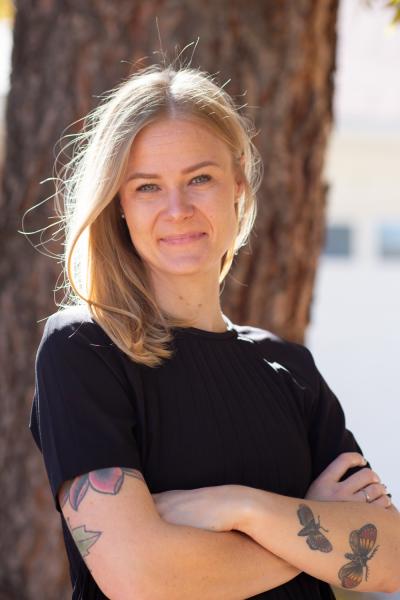American Psychological Association Division 50

Where do you work and in what capacity?
I am a licensed clinical psychologist and addiction scientist. I am currently a Research Assistant Professor at the Center for Alcohol, Substance use, And Addictions (CASAA) at the University of New Mexico.
Where did you do your training?
I completed my Ph.D. in Clinical Psychology at the University of Missouri and clinical internship at the University of Pittsburgh’s Western Psychiatric Hospital. Prior to my graduate work, I attended Northern Arizona University and received an undergraduate degree in psychology. This is where my passion for addiction science grew, and I was lucky to have supportive mentors that fostered my growth as a researcher.
What are your research interests?
I aim to conduct research that reduces harm and suffering and improves overall well-being in the lives of people with substance use disorders. Broadly, I am interested in the etiology, measurement/assessment, and treatment of alcohol use disorder. My mixed-methods program of research focuses on developing and refining assessments of alcohol use disorder, particularly etiologic and maintenance mechanisms, with the long-term goal of facilitating mechanism-based precision medicine. I am also becoming increasingly interested in transdiagnostic mechanisms and data-driven dimensional models of psychopathology.
What are your clinical interests?
Perhaps unsurprisingly, I enjoy working with people who have substance use disorders. Although I always knew this, it became even clearer to me during internship when I had the chance to work in an inpatient substance use disorder setting alongside an interdisciplinary team. I loved this experience and have always found great meaning in working with clients that other providers perceive as “challenging.” Even though I find myself becoming increasingly specialized in motivational interviewing, I also appreciate delivering cognitive behavioral therapy, dialectical behavior therapy, mindfulness-based interventions, and acceptance and commitment therapy. In graduate school, I spent three years providing free in-person and telehealth services in American Sign Language to the Deaf and Hard of Hearing communities throughout Missouri.
What are your policy/advocacy interests?
In general, I believe it is my responsibility to disseminate my research to participants and key stakeholders through accessible science communication. In fact, I recently joined the Scholars Strategy Network, a non-profit that provides training to academics interested in disseminating their findings beyond academic audiences. Beyond this, I am a huge advocate for harm reduction and safe supply, as well as reducing the stigma around substance use, and I firmly believe that progress in these areas is best made alongside people with lived experience. Further, I am involved in various initiatives related to diversity and inclusion, such as Scholars for Elevating Equity and Diversity, and I aim to center cultural humility and equity in all my work.
How did you become interested in addictive behaviors?
I have a significant family history of addiction. Being a justice-oriented person, I have always felt a deep desire to address the injustices faced by people living with substance use disorders, as well as support their loved ones. This was magnified when working as a case manager at a community treatment facility during my undergraduate studies. The horrific way patients with substance use disorders were treated at the facility, often by staff who were themselves undertrained and burnt out, encouraged me to pursue advanced training in clinical psychology. I have channeled my desire for justice into my research and clinical work and try to keep it at the center of everything I do in my professional life.
What motivated you to join the Society on Addiction Psychology (Division 50)?
I joined Division 50 in graduate school and was incredibly impressed by how friendly it was to trainees. I always felt included and valued. Since then, I have become increasingly involved in the division, primarily through service and attending Collaborative Perspectives on Addiction. It has been invaluable for networking and finding colleagues with shared interests.
Any other information that you would like to share about yourself with other SoAP members? (e.g., how do you spend your time outside of work, pet projects)
One of my most important roles in life is as a mom. I have two sons, ages 3 and 5, who keep me on my toes. Otherwise, I spend my free time outside hiking, running, riding bikes, and doing yoga. Sometimes I even read for fun. I also spend unhealthy amounts of time on Twitter (@Cassie_Boness)!

Resources are available for those struggling with addiction and numerous effective treatments exist. Whether you are looking for help for yourself or a loved one, we encourage you to seek out help.